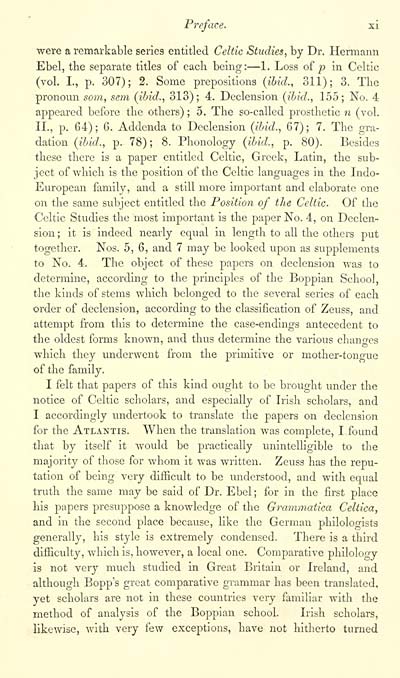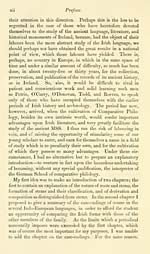Blair Collection > Celtic studies
(15)
Download files
Complete book:
Individual page:
Thumbnail gallery: Grid view | List view

Preface. xi
were a remarkable series entitled Celtic Studies, by Dr. Hermann
Ebel, the separate titles of each being: — 1. Loss of p in Celtic
(vol. I., p. 307); 2. Some prepositions {ibid., 311); 3. The
pronoun som, sem (ibid., 313); 4. Declension (ibid., 155; No. 4
appeared before the others) ; 5. The so-called prosthetic n (vol.
IL, p. 64); 6. Addenda to Declension {ibid., 67); 7. The gra-
dation {ibid., p. 78); 8. Phonology {ibid., p. 80). Besides
these there is a paper entitled Celtic, Greek, Latin, the sub-
ject of which is the position of the Celtic languages in the Indo-
European family, and a still more important and elaborate one
on the same subject entitled the Position of the Celtic. Of the
Celtic Studies the most important is the paper No. 4, on Declen-
sion ; it is indeed nearly equal in length to all the others put
together. Nos. 5, 6, and 7 may be looked upon as supplements
to No. 4. The object of these papers on declension was to
determine, according to the principles of the Boppian School,
the kinds of stems which belonged to the several series of each
order of declension, according to the classification of Zeuss, and
attempt from this to determine the case-endings antecedent to
the oldest forms known, and thus determine the various changes
which they underwent from the primitive or mother-tongue
of the family.
I felt that papers of this kind ought to be brought under the
notice of Celtic scholars, and especially of Lish scholars, and
I accordingly undertook to translate the papers on declension
for the Atlantis. When the translation was complete, I found
that by itself it would be practically unintelligible to the
majority of those for whom it was written. Zeuss has the repu-
tation of being very difficult to be understood, and with equal
truth the same may be said of Dr. Ebel ; for in the first place
his papers presuppose a knowledge of the Grammaiica Celtica,
and in the second place because, hke the German philologists
generally, his style is extremely condensed. There is a third
difficulty, which is, however, a local one. Comparative philology
is not very much studied in Great Britain or Ireland, and
although Bopp's great comparative grammar has been translated,
yet scholars are not in these countries very familiar with the
method of analysis of the Boppian school. Irish scholars,
likewise, with very few exceptions, have not hitherto turned
were a remarkable series entitled Celtic Studies, by Dr. Hermann
Ebel, the separate titles of each being: — 1. Loss of p in Celtic
(vol. I., p. 307); 2. Some prepositions {ibid., 311); 3. The
pronoun som, sem (ibid., 313); 4. Declension (ibid., 155; No. 4
appeared before the others) ; 5. The so-called prosthetic n (vol.
IL, p. 64); 6. Addenda to Declension {ibid., 67); 7. The gra-
dation {ibid., p. 78); 8. Phonology {ibid., p. 80). Besides
these there is a paper entitled Celtic, Greek, Latin, the sub-
ject of which is the position of the Celtic languages in the Indo-
European family, and a still more important and elaborate one
on the same subject entitled the Position of the Celtic. Of the
Celtic Studies the most important is the paper No. 4, on Declen-
sion ; it is indeed nearly equal in length to all the others put
together. Nos. 5, 6, and 7 may be looked upon as supplements
to No. 4. The object of these papers on declension was to
determine, according to the principles of the Boppian School,
the kinds of stems which belonged to the several series of each
order of declension, according to the classification of Zeuss, and
attempt from this to determine the case-endings antecedent to
the oldest forms known, and thus determine the various changes
which they underwent from the primitive or mother-tongue
of the family.
I felt that papers of this kind ought to be brought under the
notice of Celtic scholars, and especially of Lish scholars, and
I accordingly undertook to translate the papers on declension
for the Atlantis. When the translation was complete, I found
that by itself it would be practically unintelligible to the
majority of those for whom it was written. Zeuss has the repu-
tation of being very difficult to be understood, and with equal
truth the same may be said of Dr. Ebel ; for in the first place
his papers presuppose a knowledge of the Grammaiica Celtica,
and in the second place because, hke the German philologists
generally, his style is extremely condensed. There is a third
difficulty, which is, however, a local one. Comparative philology
is not very much studied in Great Britain or Ireland, and
although Bopp's great comparative grammar has been translated,
yet scholars are not in these countries very familiar with the
method of analysis of the Boppian school. Irish scholars,
likewise, with very few exceptions, have not hitherto turned
Set display mode to: Large image | Transcription
Images and transcriptions on this page, including medium image downloads, may be used under the Creative Commons Attribution 4.0 International Licence unless otherwise stated. ![]()
| Early Gaelic Book Collections > Blair Collection > Celtic studies > (15) |
|---|
| Permanent URL | https://digital.nls.uk/75771347 |
|---|
| Description | A selection of books from a collection of more than 500 titles, mostly on religious and literary topics. Also includes some material dealing with other Celtic languages and societies. Collection created towards the end of the 19th century by Lady Evelyn Stewart Murray. |
|---|
| Description | Selected items from five 'Special and Named Printed Collections'. Includes books in Gaelic and other Celtic languages, works about the Gaels, their languages, literature, culture and history. |
|---|

